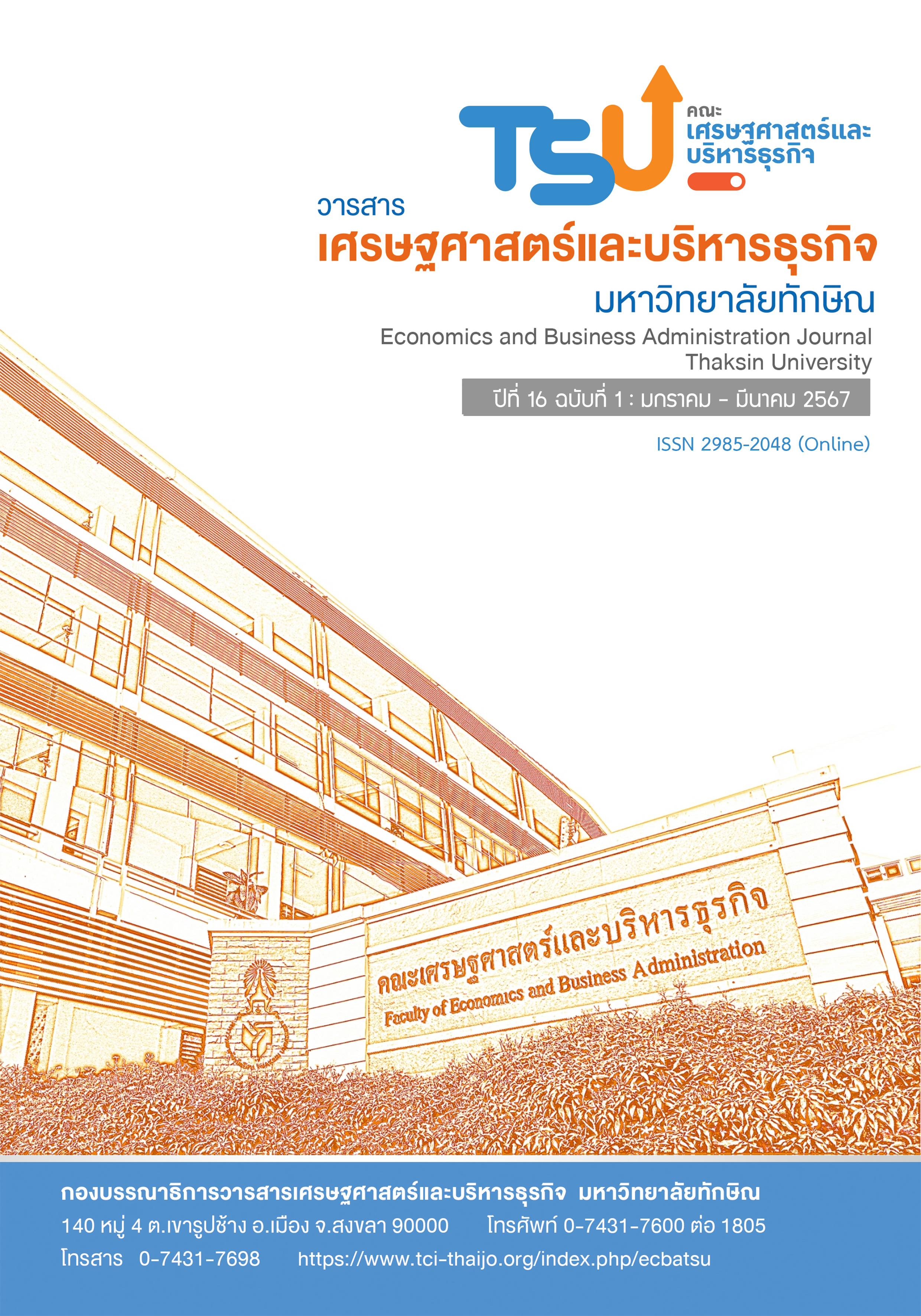อิทธิพลของภาวะผู้นำการเปลี่ยนแปลง ทุนทางจิตวิทยา และการเสริมสร้างพลังอำนาจทางจิตวิทยา ที่มีต่อพฤติกรรมการทำงานเชิงนวัตกรรมของพนักงาน
DOI:
https://doi.org/10.55164/ecbajournal.v16i1.265518คำสำคัญ:
ผู้นำการเปลี่ยนแปลง, ทุนทางจิตวิทยา, การเสริมสร้างพลังอำนาจทางจิตวิทยา, พฤติกรรมการทำงานเชิงนวัตกรรมบทคัดย่อ
การวิจัยนี้เป็นการวิจัยเชิงปริมาณโดยมีวัตถุประสงค์เพื่อศึกษาอิทธิพลของภาวะผู้นำการเปลี่ยนแปลง ทุนทางจิตวิทยา และการเสริมสร้างพลังอำนาจทางจิตวิทยา ที่มีต่อพฤติกรรมการทำงานเชิงนวัตกรรม ประชากรที่ใช้ในการศึกษาได้แก่พนักงานทุกระดับในบริษัทแห่งหนึ่งในอุตสาหกรรมปิโตรเคมี นิคมอุตสาหกรรมมาบตาพุด จังหวัดระยอง ทำการรวบรวมข้อมูลโดยใช้แบบสอบถามจากกลุ่มตัวอย่างจำนวน 342 คน โดยใช้การสุ่มตัวอย่างอย่างง่ายโดยการจับฉลาก สถิติที่ใช้ในการวิเคราะห์ข้อมูล ได้แก่ ค่าความถี่ ค่าร้อยละ ค่าเฉลี่ย ส่วนเบี่ยงเบนมาตรฐาน ค่าความเบ้ ค่าความโด่ง ค่าสัมประสิทธิ์สหสัมพันธ์ และการวิเคราะห์โมเดลสมการโครงสร้าง ผลการศึกษาพบว่าโมเดลมีความสอดคล้องกับข้อมูลเชิงประจักษ์ มีค่า CMIN/DF= 1.985, GFI= 0.935, AGFI= 0.907, CFI=0.980, RMSEA= 0.054, RMR= 0.012, NFI= 0.960 โดยภาวะผู้นำการเปลี่ยนแปลงและการเสริมสร้างพลังอำนาจทางจิตวิทยาส่งผลในทางบวกต่อพฤติกรรมการทำงานเชิงนวัตกรรม และทุนทางจิตวิทยาส่งผลในทางบวกต่อการเสริมสร้างพลังอำนาจทางจิตวิทยาเช่นกัน โดยตัวแปรในโมเดลสามารถอธิบายความแปรปรวนของพฤติกรรมการทำงานเชิงนวัตกรรมของพนักงานได้ร้อยละ 60.8
เอกสารอ้างอิง
Afsar, B., Badir, Y. F., & Saeed, B. B. (2014). Transformational Leadership and Innovative Work Behavior. Industrial Management and Data Systems, 114(8), 1270-1300.
Aphinya, K. (2020). Industry Outlook 2020-2022: Petrochemicals (Online). https://www.krungsri.com/en/research/industry/industry-outlook/Petrochemicals/Petrochemicals/IO/io-petrochemicals-20, 30 April 2022.
Arslan, F. (2022). The Mediating Role of Psychological Empowerment on the Relationship between Innovative Work Behavior and Transformational Leadership in Food and Beverage Employees: A Research of Five Star Hotels in Antalya. Journal of Global Tourism and Technology Research, 3(1), 68-83. DOI: 10.54493/jgttr.1064470.
Awang, Z. (2015). SEM Made Simple: A Gentle Approach to Learning Structural Equation Modeling. Bangi: MPWS Rich Publication.
Bass, B. M., & Avolio, B. J. (1994). Improving Organizational Effectiveness through Transformational Leadership. London: SAGE Publications, Inc.
Best, J., & Kahn, J. V. (1993). Research in Education (7th ed.). Boston: Allyn and Bacon.
Byrne, B. M. (2010). Structural Equation Modeling with AMOS: Basic Concepts, Application, and Programming. New York: Routledge.
Chen, W., Zhu, X., Sun, S., Liao, S., & Guo, Z. (2021). The Impact of Employees' Psychological Capital on Innovative Work Behavior: The Chain Mediating Effect of Knowledge Donating and Knowledge Collecting. Frontiers in Psychology, 12, 53-65.
Cortina, J. M. (1993). What is Coefficient Alpha? An Examination of Theory and Applications. Journal of Applied Psychology, 78(1), 98-104.
De Jong, J., & Den Hartog, D. (2010). Measuring Innovative Work Behavior. Creativity and Innovation Management, 19(1), 23–36.
Diana, L. N., & Sudarma, K. (2021). The Effect of Emotional Intelligence and Transformational Leadership on Innovative Work Behavior with Psychological Empowerment as a Variable Mediation. Management Analysis Journal, 10(2), 223-232.
Fornell, C., & Larcker, D. F. (1981). Structural Equation Models with Unobservable Variables and Measurement Error: Algebra and statistics. Journal of Marketing Research, 18, 382-388.
Hair, J. F., Black, W. C., Babin, B. J., & Anderson, R. E. (2010). Multivariate Data Analysis (7th ed.). Upper Saddle River, NJ: Prentice Hall.
Haji, L., Valizadeh, N., & Karimi, H. (2022). The Effects of Psychological Capital and Empowerment on Entrepreneurial Spirit: The Case of Naghadeh County, Iran. International Journal of Finance and Economics, 27(1), 290-300.
Hassanzadegan, S., Bagheri, M., & Shojaei, P. (2019). The Relationship between Psychological Capital and Job Performance: The Mediating Role of Psychological Empowerment. International Journal of Behavioral Sciences, 13(3), 104-110.
Hsu, M. A., & Chen, F. H. (2015). The Cross-level Mediating Effect of Psychological Capital on the Organizational Innovation Climate–employee Innovative Behavior Relationship. The Journal of Creative Behavior, 51(2), 128-139.
Kline, R. B. (2005). Principles and Practice of Structural Equation Modeling (2nd ed.). New York: Guilford.
Iqbal, K., & Ahmad, M. H. (2017). Effect of Psychological Capital on Organizational Commitment: Mediating Role of Psychological Empowerment. Abasyn Journal of Social Sciences, Special Issue, 72-87.
Luthans, F., Avolio, B., Avey, J. B., & Norman, S. M. (2007). Psychological Capital: Measurement and Relationship with Performance and Job Satisfaction. Personnel Psychology, 60(3), 541–572.
Luthans, F., Youssef, C. M., & Avolio, B. J. (2007). Psychological Capital. New York: Oxford University.
Meehanpong, P., Ngamkham, N., & Mesakulthavon, S. (2016). A Causal Model of Knowledge Management of Patient Unit in General Hospital under Ministry of Public Health. Nursing Journal of the Ministry of Public Health, 26(3), 78-93.
Nasir, Halimatussakdiah, & Suryani, I. (2018). Psychological Empowerment, Innovative Work Behavior and Job Satisfaction. Advances in Economics, Business and Management Research (AEBMR), 92, 636-643.
Purwanto, A., Asbari, M., Hartuti, Setiana, Y. N., & Fahmi, K. (2021). Effect of Psychological Capital and Authentic Leadership on Innovation Work Behavior. International Journal of Social and Management Studies, 2(1), 1–13.
Sagnak, M., Kuruoz, M., Polat, B., & Soylu, A. (2015). Transformational Leadership and Innovative Climate: An Examination of the Mediating Effect of Psychological Empowerment. Eurasian Journal of Educational Research, 60, 149-162.
Santoso, H., Elidjen, Abdinagoro, S. B., & Arief, M. (2019). The Role of Creative Self-efficacy, Transformational Leadership, and Digital Literacy in Supporting Performance Through Innovative Work Behavior: Evidence from Telecommunications Industry. Management Science Letters, 9(13), 2305-2314.
Setiawan, R., Suryani, T., Tirsa, G., & Eliyana, A. (2020). Boosting Innovative Work Behavior on Local Branded Fashion: The Evidence from Indonesia. Utopía Y Praxis Latinoamericana, 25(1), 66-74.
Silpcharu, T. (2014). Research and Statistical Analysis by SPSS and AMOS. (15th ed.). Bangkok; Business R & D Ordinary Partnership.
Spreitzer, G. M. (1995). Psychological Empowerment in the Workplace: Dimensions, Measurement, and Validation. Academy of Management Journal, 38(5), 1442–1465.
Sriboonwong, L., Singchungchai, P., Aree, P., Pathumarak, N., & Chatdokmaiprai, K. (2021). Leadership and Innovative Work Behavior in Public Sector: A Systematic Review. The Southern College Network Journal of Nursing and Public Health, 8(1), 181-195.
Tsang, K. K., Du, Y., & Teng, Y. (2022). Transformational Leadership, Teacher Burnout, and Psychological Empowerment: A Mediation Analysis. Social Behavior and Personality, 50(1), e11041. DOI: 10.2224/sbp.11041
ดาวน์โหลด
เผยแพร่แล้ว
รูปแบบการอ้างอิง
ฉบับ
ประเภทบทความ
สัญญาอนุญาต
ลิขสิทธิ์ (c) 2024 Faculty of Economics and Business Administration, Thaksin University

อนุญาตภายใต้เงื่อนไข Creative Commons Attribution-NonCommercial-NoDerivatives 4.0 International License.




